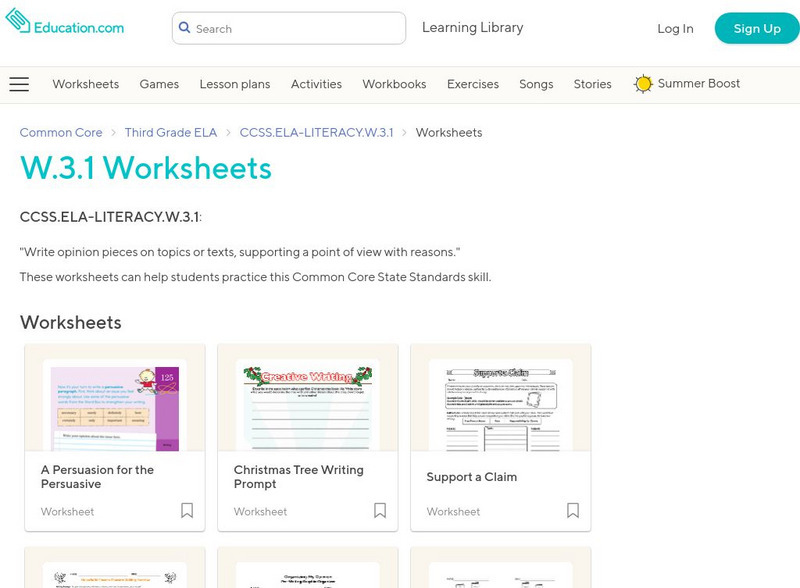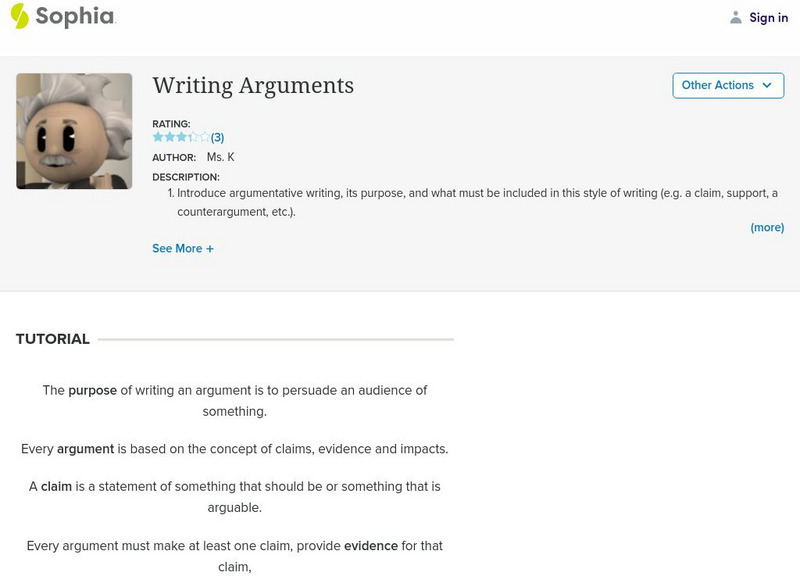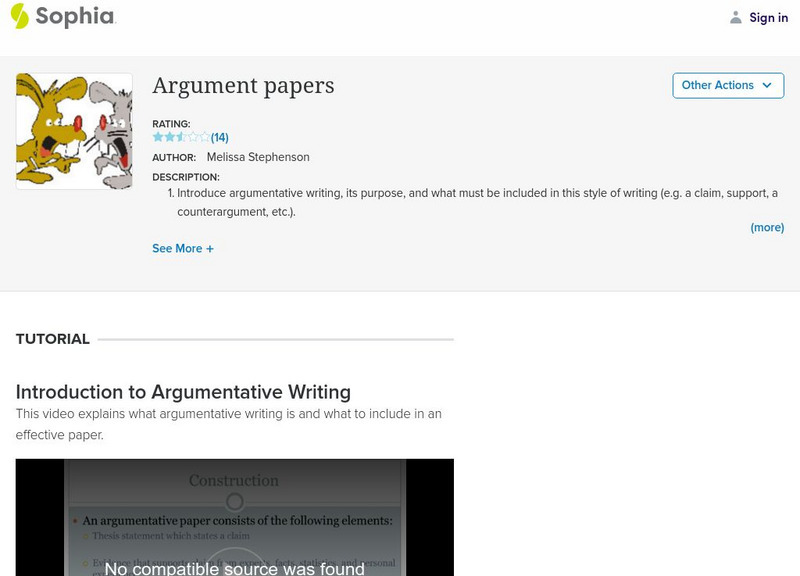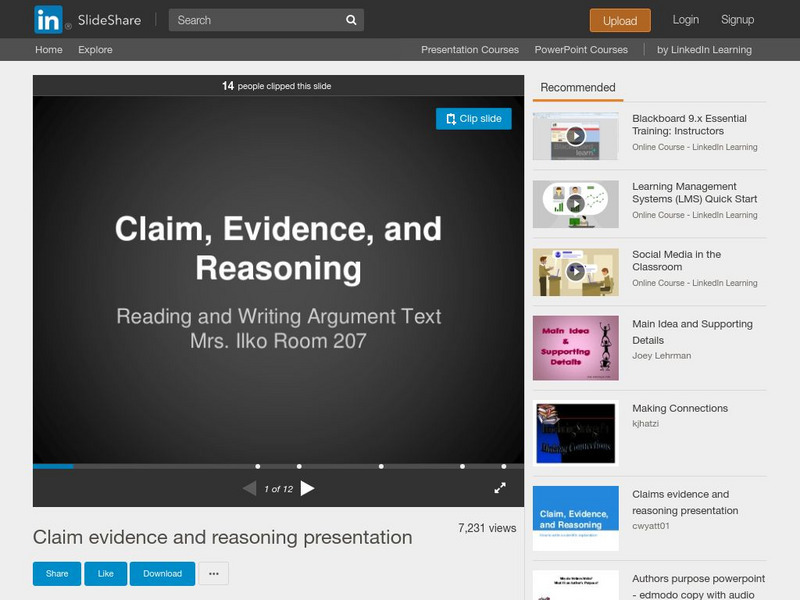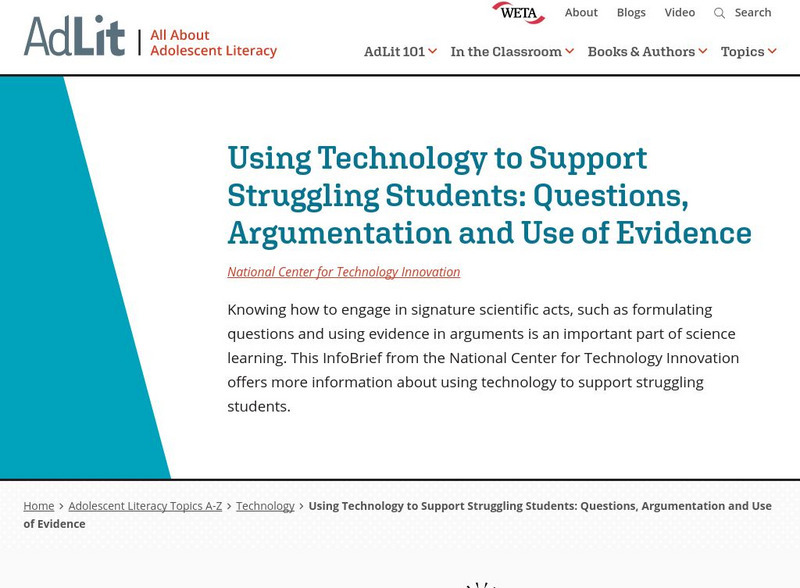Hi, what do you want to do?
CommonLit
Common Lit: To Those Who Keep Slaves, and Approve the Practice
A learning module that begins with "To Those Who Keep Slaves, and Approve the Practice" by Richard Allen, accompanied by guided reading questions, assessment questions, and discussion questions. The text can be printed as a PDF or...
Texas Education Agency
Texas Gateway: Teaching Persuasive Text: Writing Persuasive Essays
This resource explores instructional practices for persuasive essay writing in English language arts, mathematics, science, and social studies classes. It uses original content from the Texas Adolescent Literacy Academies: Focus on...
CommonLit
Common Lit: Why I Refuse to Say I "Fight" My Disability
CommonLit.org is a wonderful resource to use in a Language Arts classroom. Each story or article is accompanied by guided reading questions, assessment questions, and discussion questions. In addition, students can click on words to see...
Texas Education Agency
Texas Gateway: Informational Text: Analyze an Argument: Practice 1
When you read an argumentative essay or article, you should analyze the author's evidence. However, you can't analyze the evidence a writer gives in support of a position if you don't know the author's perspective.
CommonLit
Common Lit: "Life Isn't Fair Deal With It" by Mike Myatt
A learning module that begins with "Life Isn't Fair-- Deal With It" by Mike Myatt, accompanied by guided reading questions, assessment questions, and discussion questions. The text can be printed as a PDF or assigned online through free...
Education.com
Education.com: W.3.1 Worksheets: Write Opinion Pieces on Topics or Texts
[Free Registration/Login Required] Links to 24 worksheets and graphic organizers that can be downloaded and printed. Each activity focuses on skills highlighted in standard W.3.1: Write
Better Lesson
Better Lesson: W.3.1: Write Opinion Pieces on Familiar Topics or Texts
Links to 37 lessons that focus on skills within third grade reading standard W.3.1.
Other
Park View Middle School: Mrs. Marro Sports Argument Writing
Numerous resources are provided to support the instruction of the argument essay.
University of North Carolina
University of North Carolina: Writing Center: Handouts: Evidence
What kinds of evidence best support the points you make in a paper? Where can you find the evidence you need? This handout answers all these questions and more, including the difference between primary and secondary sources. You'll also...
Sophia Learning
Sophia: Writing Arguments
This tutorial focuses on argumentative and persuasive writing: it lists and defines the components of arguments, provides a flow chart for argumentative writing, defines counterarguments, and lists the 3 elements of persuasion: ethos,...
Georgia Department of Education
Ga Virtual Learning: Ap Literature & Composition: Self Selected Drama
This unit focuses on the students selecting a play to read and study from an extensive list provided. A link to key drama terms is provided. Student read and respond to their selected text, learn the vocabulary, and take a quiz.
Polk Brothers Foundation Center for Urban Education at DePaul University
De Paul University: Center for Urban Education: Use Evidence to Show How a Writer Supports
This Center for Urban Education resource provides a downloadable graphic organizer for students to use when analyzing the evidence that authors use to support a claim. RI.9-10.5 ideas/claims developed. CCSS.ELA-Literacy.CCRA.R.8
ReadWriteThink
Read Write Think: Persuasion Map
A printable graphic organizer for students to use when writing on opinion or persuasive essay. Directions on how to use this type of graphic organizer as well as lists of teaching ideas, lesson plans, and other resources are also...
University of Sydney (Australia)
University of Sydney: The Write Site: Evaluating Your Evidence
This essay resource teaches students how to select the type of evidence that best lends weight and credibility to their topics and how to organize the evidence effectively. A chart is provided as a quick reference. Click on pages 2-4 at...
Sophia Learning
Sophia: Argument Papers
A series of six screencast lessons explaining the process of argumentative writing. The first [4 min. 22 sec.] focuses on overall structure and purpose. The second [6 mins, 18 secs] explains how to state a claim. The third [6 min. 3...
Capital Community College Foundation
Guide to Grammar and Writing: Principles of a Composition
Writing a Paper? Here at the Capital Community College is everything you could ever ask for while preparing your essay. This site includes the writing process, structure, thesis statement, transitions, the computer as a writing...
Texas Education Agency
Texas Gateway: Analyze an Argument: Practice 1 (English I Reading)
Analyze the quality, relevance, and credibility of evidence that supports or opposes an argument.
Texas Education Agency
Texas Gateway: Analyze the Relevance, Quality, and Credibility of Evidence
[Accessible by TX Educators. Free Registration/Login Required] Analyze the quality, relevance, and credibility of evidence that supports or opposes an argument.
Lumen Learning
Lumen: Critical Reading: Logic and Structure
This lesson focuses on structure and logic including types and purposes of essays, organizational patterns, argumentative writing, and logic and fallacies.
Quizlet
Quizlet: Claim, Evidence and Reasoning Test
Informational report terms are included in this assessment. This test assesses the following text feature terms: evidence, claim, qualitative evidence, quantitative evidence, and reasoning. Images of the terms are included alongside the...
Tom Richey
Slide Share: Claim Evidence and Reasoning
A slideshow with twelve slides about reading or writing an argument, analyzing the claim and looking at how it is supported with observation, evidence, and reasoning.
Polk Brothers Foundation Center for Urban Education at DePaul University
De Paul University: Center for Urban Education: Evaluate the Strength of Evidence [Pdf]
This resource provides a downloadable worksheet that will assist students after they read a piece of nonfiction. Students will answer guided questions to help them determine the strength of evidence used when supporting a claim....
Polk Brothers Foundation Center for Urban Education at DePaul University
Depaul University: Center for Urban Education: Organize an Argument [Pdf]
This site provides a nonfiction graphic organizer that will help students organize an argument.
AdLit
Ad lit.org: Using Technology to Support Struggling Students
Knowing how to engage in signature scientific acts, such as formulating questions and using evidence in arguments is an important part of science learning. This InfoBrief from the National Center for Technology Innovation offers more...








